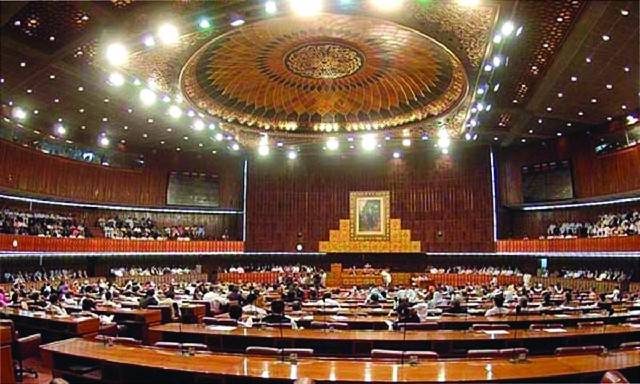
On July 5, the patriarchy in Pakistan struck once again in the name of “Islamic injunctions,” reminding us once again that the ghost of General Zia continues to haunt us.
In a letter dated July 5, the government asked the National Assembly speaker to seek the advice of the Council of Islamic Ideology (CII) on the Domestic Violence Bill already passed by it in April this year.
The bill is aimed at protecting women, children, the elderly and vulnerable persons against domestic violence. It was presented as government bill by the minister for human rights a year earlier, but it passed only recently. The Senate proposed some amendments but just when the National Assembly was to take them up, the government asked the bill be referred to the CII because it “contravened the Islamic injunctions and way of life.”
When it was first tabled in the National Assembly, the bill was endorsed by the cabinet. What caused the change of mind has not been explained. The only explanation is that patriarchy refuses to die down.
Not long ago, patriarchy forced the Khyber Pakhtunkhwa government to ban the launch of Malala Yousufzai’s book and a planned women’s bicycle rally. A local government in the province also ordered school girls to wear abayas.
Asking the speaker to seek the opinion of the CII is disturbing. More so as the CII has increasingly become a regressive body with its opinions bordering on the ridiculous.
For instance, while it recognized that child marriage must be discouraged, on the need for legislation it said, “many complications would arise due to legislation on fixing 18 years of age for marriage.”
When in April 2014 the Sindh Assembly passed a law prohibiting child marriages the council chairman demanded that members of the provincial legislature be tried for treason for ‘violating the Constitution.’ That it only provoked laughter is another matter.

In 2016, the CII proposed legislation that allowed a husband to “mildly” beat his wife “if needed.”
The council has scant regard for changing times, for logic and reason, for scientific progress or for Pakistan’s international obligations. It declared inadmissible DNA tests in rape cases as primary evidence holding it to be only of secondary value. Child Marriage Acts were passed in three provinces disregarding the pronouncements of CII. However, the KP government got the bill vetted by the council. The result was a watered down legislation.
The council has opposed moves to establish homes for the elderly as ‘against the society’s norms and traditions.’ It rejected the Women Protection Bill, 2006, being ‘contrary to the spirit of Quran.’
It also opposed the family laws requiring permission of the first wife mandatory before contracting a second marriage.
Back in 1978, it recommended that KalimaTayyaba and ‘Allah o Akbar’ be inscribed on the national flag to inspire people for martyrdom and jehad.
Under Zia, the military actually adopted the motto “iman, taqwa, jehad fi sabilillah” (faith, piety and jehad in the cause of Allah) - a motto since abandoned. The flag of Taliban bears the symbols then prescribed by the council.
While council calls for ban on hate speech on the eve of Muharram, it has chosen not to comment on the daily hate speeches against non-Muslims or on the hateful references to non-Muslims in text books.
Under the threat of clergy even saner voices in the council have been silenced. Sometime ago, the CII approved the draft of a resolution recommending amending the grossly misused blasphemy law but soon surrendered before the hardliners and went back on its recommendation.
The council submitted the constitutionally mandated “final report” to the Parliament in 1997 followed by a ‘special report’ in 2008. In its 2011 annual report it admitted that there was no legal basis to continue to submit reports but is doing it “in the interest of continuity.”
Is such an advisory body really needed in the presence of a Federal Shariat Court with powers to strike down any law deemed un-Islamic? What is there to be gained from an advisory body whose pronouncements, instead of serving the cause of Islam or democracy, have only tended to promote patriarchy?
For seeking experts’ opinions on legislation the Parliament’s rules provide for holding public hearings to which religious scholars may also be invited if needed. It appears that after the US signed a peace deal with anti-women Taiban in Doha, misogynists, right wingers and the patriarchs have acquired new strengths.
Like the Taliban, the patriarchs regard women inside the house as personal property. Outside the house they are accused of spreading ‘fahashi’ (obscenity and vulgarity). Leaning on the CII is a recipe for encouraging patriarchy.
Of course the council’s advice is not binding. The lawmaking authority rests solely with the Parliament, which mercifully has rejected its opinions in the past. But this is a poor consolation as it ignores deeper implications.
Because of authoritarian baggage of the past, the council’s pronouncements acquire an air of moral authority. And this is what proponents of patriarchy desperately seek.
To check the council from defending patriarchy, there is need for a rational debate on its constitutional and legal status. After fulfilling the constitutionally mandated function of submitting ‘final report’ its legal and constitutional status is open to serious question.
The council also has had some well meaning and enlightened scholars of Islam as its members. It would be best if they initiated this discussion. The council seems “a stranger” in the legal and constitutional structure of the country. The stranger should not be allowed to act as veritable arm of patriarchy.
The writer is a former senator
In a letter dated July 5, the government asked the National Assembly speaker to seek the advice of the Council of Islamic Ideology (CII) on the Domestic Violence Bill already passed by it in April this year.
The bill is aimed at protecting women, children, the elderly and vulnerable persons against domestic violence. It was presented as government bill by the minister for human rights a year earlier, but it passed only recently. The Senate proposed some amendments but just when the National Assembly was to take them up, the government asked the bill be referred to the CII because it “contravened the Islamic injunctions and way of life.”
When it was first tabled in the National Assembly, the bill was endorsed by the cabinet. What caused the change of mind has not been explained. The only explanation is that patriarchy refuses to die down.
Not long ago, patriarchy forced the Khyber Pakhtunkhwa government to ban the launch of Malala Yousufzai’s book and a planned women’s bicycle rally. A local government in the province also ordered school girls to wear abayas.
Asking the speaker to seek the opinion of the CII is disturbing. More so as the CII has increasingly become a regressive body with its opinions bordering on the ridiculous.
For instance, while it recognized that child marriage must be discouraged, on the need for legislation it said, “many complications would arise due to legislation on fixing 18 years of age for marriage.”
When in April 2014 the Sindh Assembly passed a law prohibiting child marriages the council chairman demanded that members of the provincial legislature be tried for treason for ‘violating the Constitution.’ That it only provoked laughter is another matter.

In 2016, the CII proposed legislation that allowed a husband to “mildly” beat his wife “if needed.”
The council has scant regard for changing times, for logic and reason, for scientific progress or for Pakistan’s international obligations. It declared inadmissible DNA tests in rape cases as primary evidence holding it to be only of secondary value. Child Marriage Acts were passed in three provinces disregarding the pronouncements of CII. However, the KP government got the bill vetted by the council. The result was a watered down legislation.
The council has opposed moves to establish homes for the elderly as ‘against the society’s norms and traditions.’ It rejected the Women Protection Bill, 2006, being ‘contrary to the spirit of Quran.’
It also opposed the family laws requiring permission of the first wife mandatory before contracting a second marriage.
Back in 1978, it recommended that KalimaTayyaba and ‘Allah o Akbar’ be inscribed on the national flag to inspire people for martyrdom and jehad.
Under Zia, the military actually adopted the motto “iman, taqwa, jehad fi sabilillah” (faith, piety and jehad in the cause of Allah) - a motto since abandoned. The flag of Taliban bears the symbols then prescribed by the council.
While council calls for ban on hate speech on the eve of Muharram, it has chosen not to comment on the daily hate speeches against non-Muslims or on the hateful references to non-Muslims in text books.
Under the threat of clergy even saner voices in the council have been silenced. Sometime ago, the CII approved the draft of a resolution recommending amending the grossly misused blasphemy law but soon surrendered before the hardliners and went back on its recommendation.
The council submitted the constitutionally mandated “final report” to the Parliament in 1997 followed by a ‘special report’ in 2008. In its 2011 annual report it admitted that there was no legal basis to continue to submit reports but is doing it “in the interest of continuity.”
Is such an advisory body really needed in the presence of a Federal Shariat Court with powers to strike down any law deemed un-Islamic? What is there to be gained from an advisory body whose pronouncements, instead of serving the cause of Islam or democracy, have only tended to promote patriarchy?
For seeking experts’ opinions on legislation the Parliament’s rules provide for holding public hearings to which religious scholars may also be invited if needed. It appears that after the US signed a peace deal with anti-women Taiban in Doha, misogynists, right wingers and the patriarchs have acquired new strengths.
Like the Taliban, the patriarchs regard women inside the house as personal property. Outside the house they are accused of spreading ‘fahashi’ (obscenity and vulgarity). Leaning on the CII is a recipe for encouraging patriarchy.
Of course the council’s advice is not binding. The lawmaking authority rests solely with the Parliament, which mercifully has rejected its opinions in the past. But this is a poor consolation as it ignores deeper implications.
Because of authoritarian baggage of the past, the council’s pronouncements acquire an air of moral authority. And this is what proponents of patriarchy desperately seek.
To check the council from defending patriarchy, there is need for a rational debate on its constitutional and legal status. After fulfilling the constitutionally mandated function of submitting ‘final report’ its legal and constitutional status is open to serious question.
The council also has had some well meaning and enlightened scholars of Islam as its members. It would be best if they initiated this discussion. The council seems “a stranger” in the legal and constitutional structure of the country. The stranger should not be allowed to act as veritable arm of patriarchy.
The writer is a former senator

